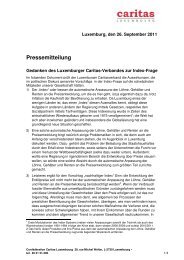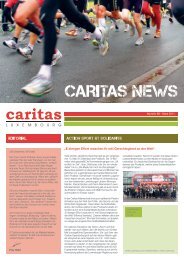Sozialalmanach - Caritas Luxembourg
Sozialalmanach - Caritas Luxembourg
Sozialalmanach - Caritas Luxembourg
You also want an ePaper? Increase the reach of your titles
YUMPU automatically turns print PDFs into web optimized ePapers that Google loves.
and were sold the most radical version of the market model, particularly by the IMF<br />
and World Bank. Now they are suffering more than other countries, as a result of this<br />
irrational exuberance. Hungary, Romania, and Latvia are surviving primarily on emergency<br />
aid from the IMF. The Baltic states, which predicted GDP declines between 13 and 17<br />
per cent in 2009, have already been forced to introduce tough retrenchment programs in<br />
public finances. Other countries, like the Czech Republic, Slovenia, Slovakia and Poland,<br />
are doing relatively well.<br />
Emerging economies, specifically Brazil and India, are expected to do much better in<br />
the post-crisis period. According to Nancy Birdsall 45 , this is partly due to the extent to<br />
which they were able to decouple themselves from financial globalisation. By contrast,<br />
lower-income developing countries, which traditionally have relied heavily on trade, will<br />
suffer severely from the crisis. Sub-Saharan countries surely and sorely lack the economic<br />
resources and institutional capacities to implement counter-cyclical fiscal policies. The<br />
temptation to focus on the incipient recovery of the more advanced OECD countries, as<br />
well as on the so-called emerging BRIC – Brazil, Russia, India, China – runs the risk of<br />
glossing over the far more devastating effects the crisis has had on developing countries,<br />
which cannot muster the resources for a counter-cyclical fiscal stimulus. Even gas- and<br />
resource-rich Russia is likely to suffer a steep fall in GDP.<br />
The ‘Varieties of Capitalism’ approach to analyzing the different domestic strengths and<br />
weaknesses of the advanced political economies can help us in understanding how different<br />
economies and economic regions adapt to the post-crisis environment 46 . Compared to the<br />
US, European countries were slow in recognising the severity of the crisis. As a consequence,<br />
monetary easing and fiscal stimulus measures were implemented less aggressively than in<br />
the US. One reason why fiscal stimulus programs were less expansive in Europe is due to<br />
the fact that the EU is made up of many small open economies. This creates free-rider<br />
problems, with the benefits of fiscal stimulus spilling over into neighbouring economies.<br />
While the US is more indebted, it has the advantage of being an immigrant economy with<br />
flexible labour markets, which will make it relatively easier to mobilise labour and other<br />
resources than in the ageing European and Japanese economies. Under conditions of low<br />
growth, China as well as European export-oriented economies will no longer be able to<br />
rely primarily on industrial exports to drive their economies.<br />
As much as we can anticipate the policy debate about competing models to reach new<br />
levels of intensity in the near future, it is our contention that it is useless to couch policy<br />
responses to the current crisis in terms of a battle between warring alternatives. Triggering<br />
45 Birdsall (2008).<br />
46 Hall & Soskice (2001).<br />
171








